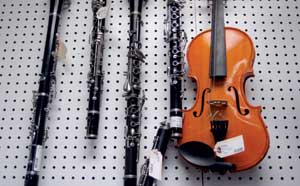As consumers nationally, worried about their jobs and the economy, tighten their pocketbooks, many retail and service sectors will struggle. But for some, the gloom of an economic recession can mean an uptick in business.
Pawn shops from around the valley report that pawn activity has skyrocketed in recent months, coinciding with the national economic crisis and, even more so, high gas prices earlier this year.
“There were people coming in saying they needed to pawn things because they needed gas to get to work,” John Taylor, an employee at First National Pawn, said.
Economists call these types of businesses “countercyclical.” From health care and community colleges, to mechanics and thrift stores, certain job sectors often hold up better than others during recession because they offer services and products that fill essential needs, provide cheaper alternatives or offer ways to retool for new careers.
Taylor estimates inventory at the Kalispell pawn shop has nearly doubled in recent months, especially in the areas of tools, musical equipment and bikes. Because it’s a chain, First National Pawn has been able to continue taking items, he said, even sending a few truckloads of items to other locations. Other area shops, dealing with a glut of inventory, say they’ve started to turn some products away.
 |
|
A selection of clarinets and a violin are seen for sale, among other instruments, at First National Pawn in Kalispell. |
November and December are generally busy months for pawn shops anyway as people try to get more cash to cover Christmas. Then, during the first few months of the year, people usually recover from the holidays and return to buy their items back out of pawn.
But the rush started earlier this year, local shop owners say, and fewer people are coming back for their possessions.
“The biggest change I’ve seen is that there’s a lot more people letting things go,” Steve Cranska, owner of the Wooden Nickel in south Kalispell, said. “It used to be about 20 percent didn’t buy back; now, it’s up to about 40.”
Nationally, thrift stores and consignment shops are among those seeing the largest increase in business as the economy has frugal customers on the hunt for bargains in a serious way.
The numbers are telling: Overall retail sales fell 2.8 percent in October – the largest percentage decline since 1992. The National Association of Resale and Thrift Shops, however, said members across the country are reporting an average 30-percent increase in business from January through August compared with the year-ago period. People donating or selling their clothes to consignment is up 75 percent.
Jim Watson, manager of the Flathead Industries’ thrift stores, said the Kalispell store is doing four or five times the business on any given month than it did last year. But he attributes the increase to the company’s change in location more so than the economy.
“Without a year under our belts in this new location, it’s hard to tell,” he said. “It’s a different business in this new store.”
Watson is happy to be bucking another economic trend, though: “The thing that surprises me is that in this down economy our donations are as good or better than they’ve been all summer long.”
Some local automotive-repair businesses are seeing changes, too. As consumers cut back on buying new cars, they’re spending more money at local garages trying to squeeze more miles out of their existing wheels.
Agni Howell, of Howell’s Auto Repair, said business is up about 30 percent, but that it’s hard to tell if that’s a result of the economy or just part of his usual up-and-down business cycle. “I am hearing people who are coming in and getting their car ready for winter, saying that they’re not going to buy a different used car, let alone a new one, because they need to use the one they’ve got,” he said.
Throughout each business, owners say their respective trends aren’t quite a windfall, but hope that it may provide them some protection against the economic downturn.
“I’d rather be in this business than a lot of others,” Howell said.